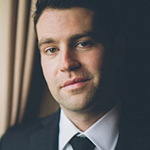Tech Talk Translators
MMM course’s new instructors focus on creating digital designers with the ability to build bridges to the world of software engineers and developers.
Jeffrey Cohen and Ben Block have combined to spend more than 40 years focused on software development. The two united their knowledge and experiences to help prepare MMM students to thrive in the technology-centered world.
MMM is a dual-degree program between Northwestern Engineering and the Kellogg School of Management.
Cohen and Block are partnering to teach Digital Design and Development, a course meant to bridge the gap between product designers and developers.
 “There isn’t enough collaboration between non-technological stakeholders who feel intimidated or confused by all the engineering discussions and the engineers who don’t have patience for that,” said Block, currently a freelance software developer. “Where I've seen the most success is in that vein of communication and making sure everyone is having the same conversation.”
“There isn’t enough collaboration between non-technological stakeholders who feel intimidated or confused by all the engineering discussions and the engineers who don’t have patience for that,” said Block, currently a freelance software developer. “Where I've seen the most success is in that vein of communication and making sure everyone is having the same conversation.”
The five-week course is taught to first-year students in the winter quarter and is a sprint through a variety of software design tools they will encounter in the real world. That they will encounter those tools – not might encounter those tools – is why the course is so important, the instructors said.
“There is no business now that is not technology-enabled,” Block said. “All these future leaders are going to engage with a technical team or a technical product servicing their business. To understand what the team goes through to ideate and build that product is important for any stakeholder.”
 Cohen is the founder of Software for Research, a company that builds software for clinical research in behavioral sciences at academic institutions. To explain how work has changed during his career, he shared an example of an automobile assembly line. The key focus areas for car buyers used to be the engine; today, that focus often is on the technology that makes a car more enjoyable to drive.
Cohen is the founder of Software for Research, a company that builds software for clinical research in behavioral sciences at academic institutions. To explain how work has changed during his career, he shared an example of an automobile assembly line. The key focus areas for car buyers used to be the engine; today, that focus often is on the technology that makes a car more enjoyable to drive.
That means that software designers and developers play key roles more than ever before, even in traditional, non-technology businesses.
“A MMM student who already has that eye for design, if they know how to bridge the gap and have meaningful conversations with software engineers, that’s a very powerful place to be,” Cohen said. “If there is empathy for what each side is working on, the chance of success for that project is much higher.”
The instructors lean heavily on their industry experience to give students hands-on learning opportunities using real-life situations faced by software developers. The emphasis, Cohen said, is promoting greater collaboration by providing an understanding of the tools used by those developers.
The end result should be a student with a clearer picture of what it takes to turn an idea into a business reality.
“For MMM students, ideating a process is a big part of their education, but how do you take that ideation process and what are the practical components of it that need to be challenged to end up at an actual product?” Block said. “We’re trying to show the thought and tools and collaboration needed to build that bridge successfully.”
